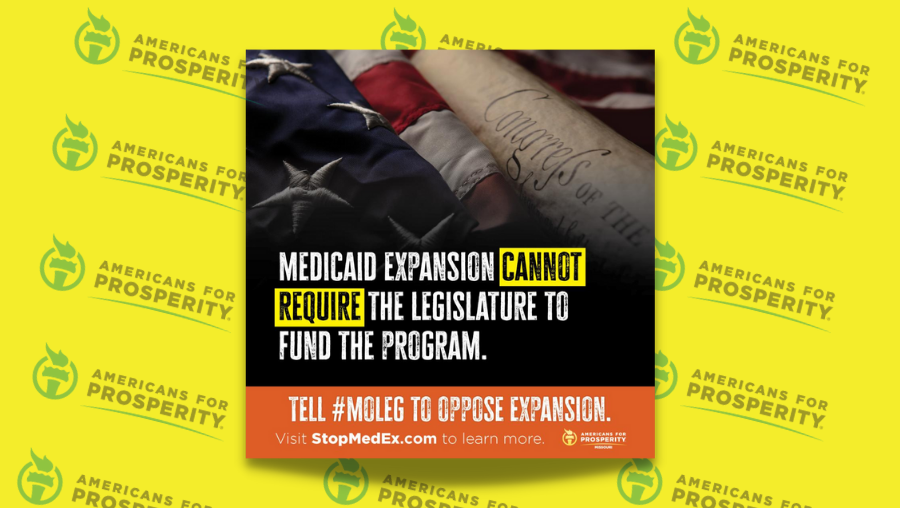Despite years of effort by the Koch political network and the GOP to stop it, Missouri’s expanded Medicaid program will start enrolling new applicants on Oct. 1.
Missouri voters approved a ballot measure in August 2020 for a constitutional amendment to extend Medicaid to Missourians who earn up to 138% of the poverty line, as opposed to the prior law which provided benefits up to only 100% of the poverty line. That means that 205,000 residents qualify for the program.
After the measure passed, libertarian billionaire Charles Koch’s astroturf group Americans for Prosperity (AFP) encouraged the GOP-led state legislature not to fund the expansion, but on Aug. 9 of this year, a Missouri judge ruled that the state must move ahead on enrolling applicants.
The nonpartisan policy group Kaiser Family Foundation says studies show that Medicaid expansion “helps to expand coverage and reduce the uninsured, improve access to and utilization of care, reduce uncompensated care costs, improve affordability of care and reduce racial and ethnic disparities in coverage.”
With Missouri beginning enrollment for new Medicaid applicants, just 12 states remain that have not taken advantage of the Medicaid expansion option offered under the 2010 Affordable Care Act, which initially provides for the federal government to pay 90% of the cost of expansion. An estimated four million Americans would gain coverage by Medicaid if it was expanded in the remaining states.
AFP and the right-wing Foundation for Government Accountability are leading campaigns to keep that from happening.
- In Wisconsin, AFP claims to have helped stop Medicaid expansion this spring by activating its 124,000 members in the state, running ads on social media, and direct lobbying.
- In South Carolina, AFP opposed expansion in the 2021 legislative session and instead proposed increasing individual access by, for example, increasing Health Savings Accounts limits to pay for health care. Most people up to 138% of the poverty line have no money to contribute to such tax-free accounts.
- In Wyoming, Florida, and other states, the Foundation for Government Accountability—with $11.4 million (2012-2019) from the preferred donor conduits of the Koch political network, DonorsTrust and Donors Capital Fund, and another $11.2 million (2014-2019) in funding from the GOP megadonor Dick Uihlein—testified against expansion in GOP-led legislative committees.
South Dakota Is Next Battleground
If enough signatures are collected by this November, a voter initiative will appear on the ballot in South Dakota to expand Medicaid under state law on Nov. 8, 2022.
Sponsors of the initiative are also circulating a similar measure that would amend the state constitution to expand Medicaid. Groups supporting the measures include the AARP, the South Dakota Association of Healthcare Organizations, the Community HealthCare Association of the Dakotas, the Farmer’s Union, the South Dakota Education Association, the South Dakota State Medical Association, the American Cancer Society Cancer Action Network, and the American Heart Association.
Medicaid expansion in South Dakota would insure 27,800 non-elderly adults, 42% of the state’s uninsured population. Seven of ten of the newly insured would be adults living below the poverty line.
AFP-South Dakota has begun circulating a petition against expansion, arguing that “Medicaid was intended to help America’s most vulnerable like the elderly and the disabled, but its expansion to able-bodied working adults would create massive strains on taxpayers and shrink resources available for those truly needy populations.”
Invoking “able-bodied people” gaming the system is AFP’s familiar trope in state after state, while there is evidence that few non-working, able-bodied people benefit from Medicaid expansion. According to the Center for Health Policy Research at George Washington University,
Only 13 percent of adults covered by Medicaid’s expansion are able-bodied and not working, in school, or seeking work. Of that small group, three-quarters report they are not working in order to care for family members and the rest report other reasons, like being laid off. A much higher share of overall American adults are unemployed or not in the labor force (28 percent), according to 2015 Census data. Medicaid expansion enrollees are more likely to be working or looking for work than the general public, unless they are burdened by ill health or the needs of their families.
If South Dakota were to act now, the American Rescue Plan Act would give, in addition to the 90% federal matching funds available under the Affordable Care Act, another 5% increase in their regular federal matching rate for two years after the expansion takes effect.
The American Rescue Plan Act, the $1.9 trillion Covid rescue plan passed by Congress in March 2021, also extends postpartum coverage, provides for 100% coverage for Covid vaccinations for those on Medicaid, and increases funds for home and community-based medical services.
AFP opposed the American Rescue Plan Act and spent over six figures organizing against it through social media advertising, radio advertising, and door-to-door canvassing in ten swing states.
Efforts are also underway to put Medicaid expansion initiatives on the ballot in Florida and Mississippi in 2022.



If KOCH is for Americans for Prosperity, why would it be against helping more Americans be prosperous? Is it just that they want the already prosperous to be more prosperous and leave the rest of the people out? Don’t they want everyone to be healthy? If all Americans have access to health care, that would be a plus. Who wants to have a nation of weaklings, when we are the richest nation in the world? We are supposed to be an example to the rest of the world in all areas…and we have the opportunity do do so! Why not take it?